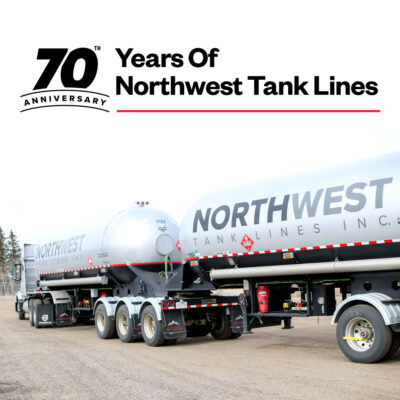Our commitment to safety extends beyond safe driving and equipment. It is also important to us that your families and communities are safe at home, which is why we are proud supporters and partners with the Canadian Cancer Society. Here is some news and updates from the Canadian Cancer Society.
The Canadian Cancer Society tells us:
“Nearly half of Canadians are expected to be diagnosed with cancer at some point in their lives and 1 in 4 are expected to die.”
This statistic is heart-breaking, but it also shows us how far cancer research has come. In 1940, the overall cancer survival rate was around 25%. Today, the survival rate is 60%. As a society, we have achieved this amazing progress by investing in cancer control which encompasses prevention, early detection and treatment.
The Canadian Cancer Society Is Making Great Strides
In the previous year, Canadian Cancer Society supported Canadians affected by cancer in communities across the country, funded game-changing cancer research and advocated to governments for important social change.
Cancer-Prevention Tips
Your best defense against cancer is prevention and early detection. That means you need to take the wheel and be proactive with your health by taking care of yourself and getting screened.
Did you know that 4 in 10 cancers can be prevented? With dietary and lifestyle changes, you can reduce your risk of cancer. By changing what you eat, drink, breathe and do every day, you can be your own line of defense against cancer. Here are 5 ways to reduce your cancer risk:
1. Live Smoke Free
Smoking is an addiction that is very harmful for your body. In fact, 18% of cancer cases are due to smoking tobacco. Quitting smoking is challenging but it is never too late to quit. Create an action plan and build a support group to keep you on the right track. You can reduce your risk substantially by quitting.
2. Be Active
Keep your body moving! Getting enough physical activity on a regular basis will help lower your risk against at least 8 types of cancers. Truckers often spend so much time on the road that it can be difficult to get exercise in. Introduce stretching and exercises throughout the day. Try to include more activity in your routine and aim for at least 15-30 minutes of exercise a day. Your body will thank you for it!
3. Eat a Well-Rounded Diet
There are many benefits of eating a well-rounded diet – including reducing your cancer risk! Practice healthy eating habits and incorporate many fruits, vegetables, and whole grains into your meals. Keep healthy snacks with you and opt for healthy meal options when on the road.
4. Be Sun Safe
Protect your skin from the sun year-round! Too much direct sun exposure can lead to an increased risk of melanoma. When it’s sunny, wear a hat, seek out some shade, wear sun protective clothing, and a sunscreen with SPF 30 or higher.
5. Get Screened
Get screened. It could save your life. When cancer is found early, it is easier to treat. Some screening tests can detect for cancer before you notice any symptoms. The earlier a cancer is detected, the better your chance of survival.
The Importance of Early Detection
By taking these measures, you’ll reduce your risk of the 4 preventable cancers. But what about the other 6? This is where early detection and screening comes in. Be body-aware. Note any changes in your body and talk to your doctor about them.
Changes that are important to share with your doctor include:
- Lumps in the breast or sores anywhere on the body or in the mouth that won’t heal
- Obvious changes in the size or shape of moles
- New growth or red patches on your skin that bleed or itch
- New or unusual swelling in the testicles or breasts or anywhere else on the body
- Any unusual blood or discharge
- Weight loss, a feeling of low energy, aches or pains that can’t be explained
- Changes in bladder habits
- Indigestion or problems swallowing
- Nagging cough or hoarseness in the voice.
Even if you have no symptoms, make sure you are getting screened regularly. Screening tests can detect some cancers before they cause symptoms – and this is the best time to fight cancer. Some tests will even find changes in the body that could become cancer if they aren’t treated. Regular screening detects colorectal cancer, cervical cancer and breast cancer.
Get screened early, often, and as comprehensively as possible.
How do you find out if you should get screened? Talk to your family doctor and learn your family’s history of cancer, so that you can better understand your personal risk level.
Screening is important because when you find cancer before you have symptoms, it is easier to treat. The treatment may be less invasive, and you will need less time to recover.
Other Exciting Canadian Cancer Society News:
Successful Dry February!
Thank you to everyone who challenged themselves to go alcohol-free for #DryFeb and raised funds to support the work of the Canadian Cancer Society! The less alcohol you drink, the more you reduce your cancer risk.
A Former Smoker Shares How She Quit Smoking.
Here’s a story that’s truly inspiring! When Karine was 18, she was already a regular smoker but this month, she’s celebrating 3 years of being smoke-free! Find out how she quit smoking with help from Canadian Cancer Society’s Walk or Run to Quit program.
At Northwest, we believe in working towards a future where cancer is a treatable illness for everyone, and that future starts with both increased awareness and funding. With this campaign, we hope to help the Canadian Cancer Society take another step towards that future.
So, spread the word. Encourage your family and friends to get screened. Share this article. Any action, no matter how small or large, is a positive action. More information on our partnership with the Canadian Cancer Society can be found here.



